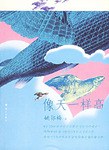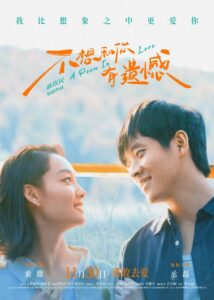A Poem in Love
不想和你有遗憾
China, 2024, colour, 2.35:1, 98 mins.
Director: Jiang Qinmin 蒋钦民.
Rating: 3/10.
Some striking photography of a national park in Inner Mongolia is the only memorable thing about this faux-naif essay on misdirected love.
Yi’ershan township, Arxan city, northeast Inner Mongolia, China, sometime in the 1980s. Zha Xiaoxi (Suo Wei) arrives by train in Yi’ershan township. She’s come in search of her childhood friend Kang Sai (Cheng Lei), who wants to be a poet and left his hometown six months ago to live in a remote part of northern China. On the platform Zha Xiaoxi is accosted by a souvenir-seller, Yuan (Luo Zhaodong), who’s very friendly towards her. In town she finds Kang Sai is actually staying with Yuan. He’s very moody and doesn’t want to talk to her; but she gives him an invitation to the White City Writers’ Festival that arrived at his home and his mother gave her to pass on to him. He says he won’t accept it, and runs off. Zha Xiaoxi and Yuan later find him face down in a field outside town. Kang sai says he wants to find his “Walden” – a reference to a remote cabin by a lake where US transcendentalist writer Henry David Thoreau lived for two years in harmony with nature. Zha Xiaoxi and Yuan find an abandoned barn, which they dub Taole 陶乐 (“happiness”), where the three of them can stay, Kang Sai can write his poetry and Zha Xiaoxi write her novel. When Zha Xiaoxi and Yuan copy Kang Sai’s jottings that he’s left scattered around and send them to a poetry magazine that publishes them, Kang Sai throws a tantrum. One day he disappears, eventually returning with a young woman, Yanzi (Luan Leiyin), whom he met at the writers’ festival and whom he introduces as his girlfriend. Zha Xiaoxi, who’s deeply in love with Kang Sai, is devastated. When Yuan returns from a trip, he sees what has happened; and after Kang Sai and Yanzi leave the next day for Yi’ershi, Yuan, who’s always fancied Zha Xiaoxi, makes his move on her. She finally gives in to Yuan’s advances, though it’s clear she estill has Kang Sai in her heart. Some time later, Zha Xiaoxi and Yuan are staying in Yi’ershi, where she makes some money by delivering milk, while Yuan is hospitalised with an illness. By chance, Zha Xiaoxi finds Kang Sai reciting poetry in a park to an audience of other poets, including Chen Hua’er (Wang Bin). When he returns to the hospital, Yuan has disappeared and, to her surprise, she learns he has a terminal illness. Yuan has left her a tinbox with some money and documents. Zha Xiaoxi continues to visit Kang Sai in the park, until he is imprisoned for getting into a fight there. When he’s eventually released, Zha Xiaoxi is at the prison gate to meet him. But so is Yanzi, who says she’s pregnant. Shattered, Zha Xiaoxi goes back to Taole alone. After several months, however, she’s joined by both Kang Sai and Yuan, and the three try to re-create their original idea of a utopian retreat.
REVIEW
A story of multiple loves in a scenic corner of Inner Mongolia during the 1980s, A Poem in Love 不想和你有遗憾 aims for a kind of metaphysical naivety but ends up sounding like a badly written and played youth romance. Striking widescreen photography of Arxan National Forest Park – a tourist spot with crater lakes and dense woodland – can’t paper over the faults in this often embarrassing ode to misdirected love, which started shooting in 2018, was passed for release in late 2019, but only made it to cinemas five years later, to tiny box office of RMB17.5 million.
Though it looks like the work of an inexperienced writer-director, it’s actually not. Hunan-born Jiang Qinmin 蒋钦民, now 61, has been writing scripts since the late 1980s and directing since the early 2000s, starting with Manchurian war drama The Sunflower Disaster 葵花劫 (2001) – one of several films dealing with Japan, where he studied for eight years – and including everything from romances like Pure Love 纯爱 (2007) to smoothe rom-coms like My Airhostess Roommate 恋爱前规则 (2009). A Poem in Love is the final film in a “love trilogy” that started with the fine Sky Lovers 天上的恋人 (2002), set in a remote Chinese village in the 1950s, and continued with the very Japanese-looking Tokyo Newcomer 初到东京 (2012), centred on a young Chinese man’s passion for the boardgame of go.
With virtually no backgrounding, the film starts with a young woman called Zha Xiaoxi (Suo Wei 索微, in her first leading role) arriving in Inner Mongolia after travelling “halfway across China” to see her childhood friend Kang Sai (Cheng Lei 丞磊), who fancies himself as a poet and has gone away seeking artistic seclusion. She finds him staying with a souvenir seller, Yuan (Luo Zhaodong 罗昭东), with whom Zha Xiaoxi finds a suitably secluded old barn for Kang Sai to scribble away in while she works on her novel. She’s been in love with Kang Sai since childhood but he seems cool to her; Yuan, meanwhile, has fallen for her but she’s not interested. And then one day Kang Sai brings back a girlfriend.
The basic theme of misdirected love is interspersed with poetic ramblings on the soundtrack (largely uninspired), plenty of forced dialogue, and characters coming and going across passages of time. The striking looking Suo, then in her mid-20s, tries hard but the whole film is holed by no reason given for her character and Yuan putting themselves out so much for such a self-centred, self-entitled character as Kang Sai. Performances by Cheng (especially) and Luo (partly) are one-dimensional.
 Some atmospheric scoring by Huang Yongcan 黄永灿 supports the Inner Mongolian setting without becoming too ethnic, but otherwise it’s only the superb landscapes of d.p. Ji Weimin 吉卫岷 that linger. The whole thing is based on a 2006 novel, 像天一样高 (literally, “As High As the Sky”, see cover, left), by Yao Emei 姚鄂梅, which first made her name. The film’s Chinese title means “Don’t Want to Have Any Regrets over You”.
Some atmospheric scoring by Huang Yongcan 黄永灿 supports the Inner Mongolian setting without becoming too ethnic, but otherwise it’s only the superb landscapes of d.p. Ji Weimin 吉卫岷 that linger. The whole thing is based on a 2006 novel, 像天一样高 (literally, “As High As the Sky”, see cover, left), by Yao Emei 姚鄂梅, which first made her name. The film’s Chinese title means “Don’t Want to Have Any Regrets over You”.
CREDITS
Presented by Beijing New Performance Film Culture Communication (CN). Produced by Beijing New Performance Film Culture Communication (CN), Beijing Ordinary City Culture Media (CN).
Script: Jiang Qinmin, Xu Gong [Xu Jianliang], Hao Zhuangzhuang. Novel: Yao Emei. Photography: Ji Weimin. Editing: Jiang Qinmin. Music: Huang Yongcan, Mei Yinzhi. Music direction: Huang Yongcan. Art direction: Wu Lizhong. Costume design: Li Gaiqin. Sound: Li Qingshan, Li Xuelei. Visual effects: Liu Peiyu. Poetry supervision: Fang Wen. Poetry editing: Wu Ang, Xi Nan. Executive direction: Liang Fei.
Cast: Suo Wei (Zha Xiaoxi), Luo Zhaodong (Yuan), Cheng Lei (Kang Sai), Luan Leiying (Yanzi), Wang Bin (Chen Hua’er).
Release: China, 30 Nov 2024.
